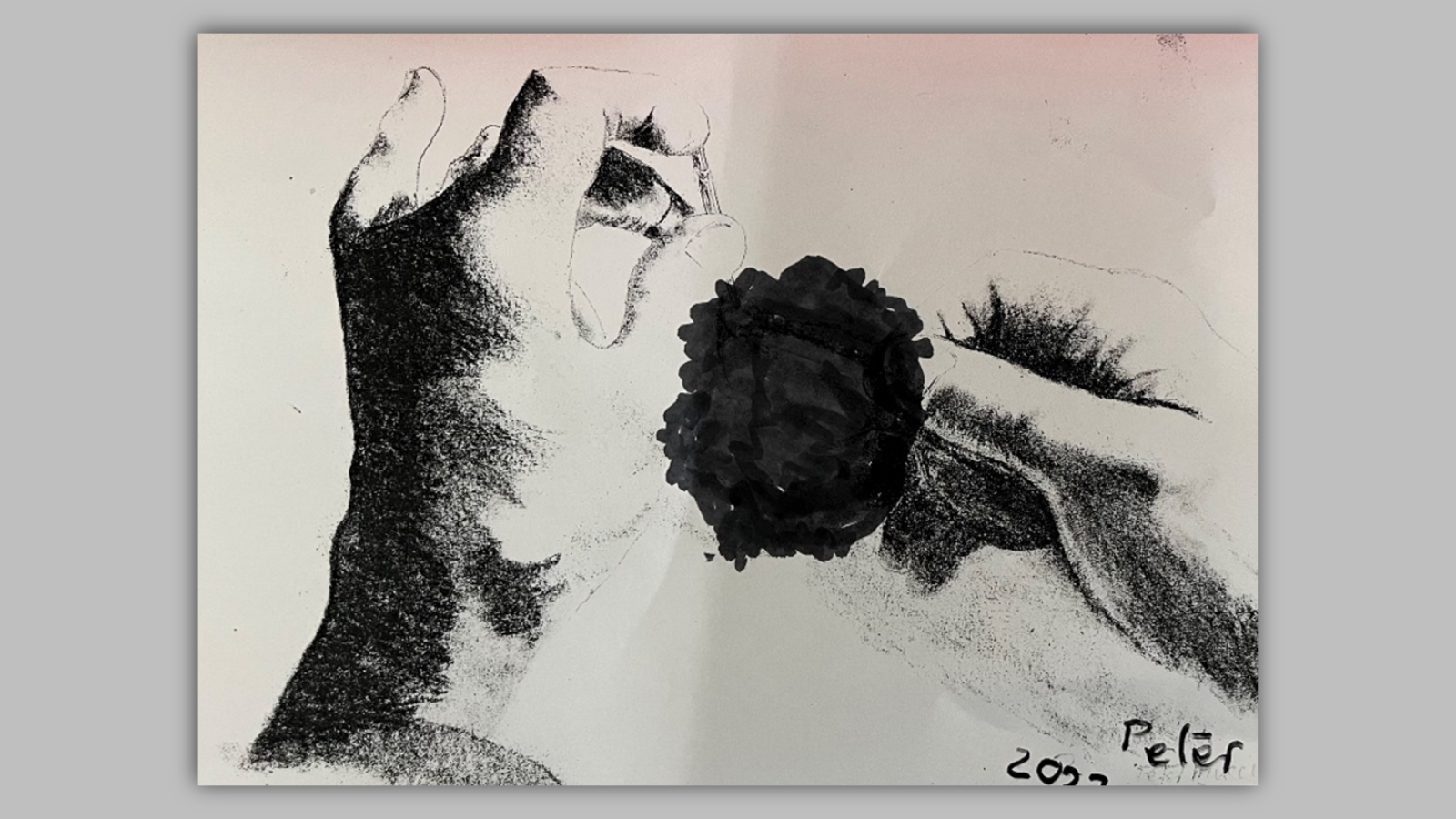Age-Related Macular Degeneration
 Age related macular degeneration (AMD) is the most common cause of blindness in the western world.
Age related macular degeneration (AMD) is the most common cause of blindness in the western world.
There are two types of AMD known as 'Dry' and 'Wet'. There is currently no treatment for 'Dry' AMD but 'Wet' is treated by injections to the eye. We have a growing team of scientists working on discovering more causes of this devastating disease. With your help this will lead to new or improved treatments or therapies for patients in the future. This image is drawn by a talented artist with AMD who was able to demonstrate how the condition affects his vision.
Sometimes sight loss causes a phenomenon called Charles Bonnet Syndrome which can be mistaken for hallucinations.
Impact of Diet on AMD
One of our PhD students has produced a animated video, featuring Andrew Lotery highlighting the impact of diet on Age Related Macular Degeneration (AMD). Diet and nutrition is strongly linked with eye sight, where a healthy, balanced diet can protect people from diseases such as age-related macular degeneration, in the same way that unhealthy foods (typified by a fast food diet) can increase the chances of eye disease.
Dry Age-Related Macular Degeneration
Dry age-related macular degeneration (AMD) is the most common form of this disease. The cells of the macula decay and disintegrate. Clinical trials are currently being undertaken using drugs to slow progression of the disease and an AI trial is working on finding a way to identify those at risk of developing this devastating condition.
Diet. Studies suggest that people who eat a diet rich in carotenoids (powerful antioxidants) have a lower risk of developing AMD. Our research team have also found evidence that an 'unhealthy' diet can be detrimental to vision.
Vitamins. There is no evidence to date that taking vitamins when there are no clinical signs of disease will prevent age-related macular degeneration. It is thought that they may help to slow the disease in some people with early - to mid-stage AMD.
Smoking is a major risk factor for both wet and dry macular degeneration. If at all possible patients should stop or reduce smoking.
Sunshine is lovely but please wear sunglasses to protect your eyes from damaging UV-A and UV-B rays.
Patients who have been diagnosed with ‘dry’ AMD can sometime progress to the ‘wet’ type and should be aware that this can happen as this is considered an emergency in order that treatment may be started at the earliest possible opportunity. If left too late scarring can occur which will reduce the chances of successful treatment.
Wet Age-Related Macular Degeneration
Wet macular degeneration is the most severe form of AMD. Vascular endothelial growth factor (VEGF) is a signal protein produced by cells that stimulates the formation of new blood vessels. These cause distortion of vision and, if left untreated, lead to scarring and permanent loss of sight. Treatment with anti-VEGF drugs can halt the growth of these blood vessels and prevent further damage. However, any delay in being diagnosed by an eye specialist can lead to permanent visual loss.
We have a growing team of scientists identifying the causes of this disease. Clinical trials are also in progress to identify and improve treatment options.
Signs of Wet AMD
Signs of Wet AMD include the following symptoms, which shouldn't be ignored:
- Sudden blurring of central vision
- Distortion of vision e.g. the side of a door frame has a kink in it when it should be straight
- Objects looking smaller or bigger than they should be
What to do if you think you have wet AMD
 If you think you have wet AMD you need urgent medical assessment and should contact your GP or optometrist, as an early diagnosis can save sight. Local eye clinics have casualty areas so please telephone them if you are unable to contact your GP.
If you think you have wet AMD you need urgent medical assessment and should contact your GP or optometrist, as an early diagnosis can save sight. Local eye clinics have casualty areas so please telephone them if you are unable to contact your GP.
If you have been diagnosed with 'wet' AMD please do watch our video which was made with generous support from patients.

